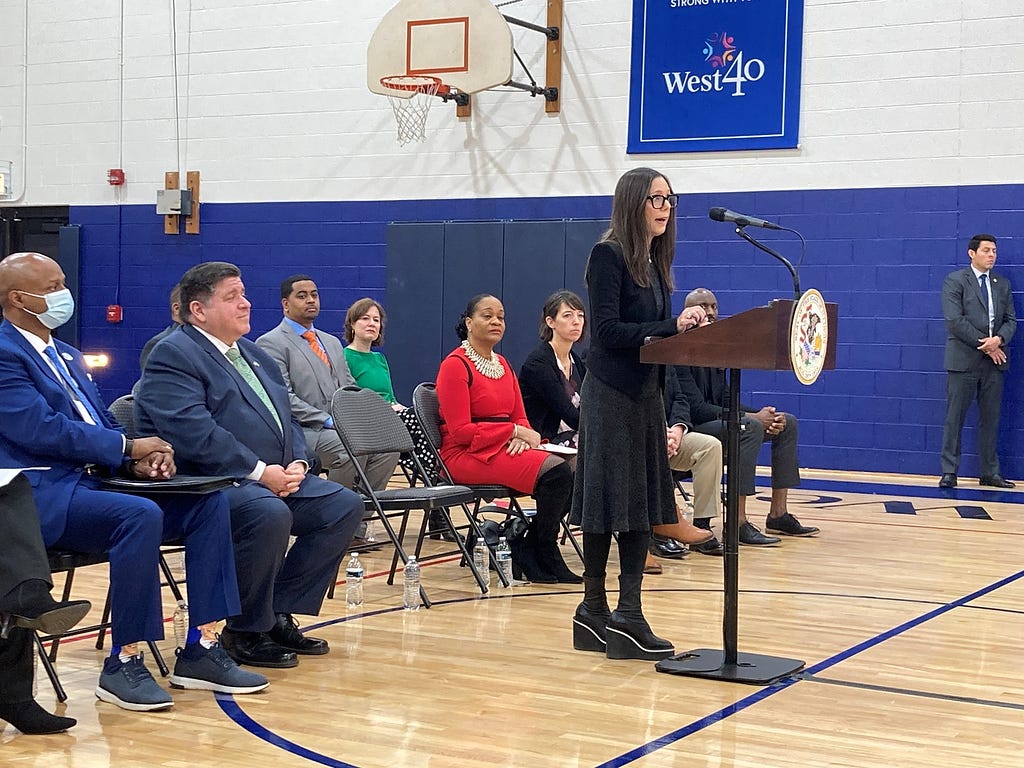Healing A Broken Mental Health System: Dr Dana Weiner Of Chapin Hall at the University of Chicago On 5 Things That Can Be Done To Fix Our Broken Mental Health System
An Interview With Stephanie Greer
Improve communication about the respective roles of state agencies, private providers, and the services they offer to children, adolescents, and families.
The current state of the mental health system is a conversation that echoes in the halls of policy-making, the corners of social advocacy, and within the private struggles of individuals and families. As we continue to witness an unprecedented need for robust mental health support, the shortcomings of the existing system become more glaring. It is within this backdrop that we seek the insight of those who are at the forefront of behavioral health. In this interview series, we are talking to behavioral health leaders, policymakers, mental health practitioners, advocates, and reformers to share their perspectives on healing our broken mental health system. As a part of this interview series, we had the pleasure of interviewing Dana Weiner, Senior Policy Fellow at Chapin Hall and the Chief Officer for Children’s Behavioral Health Transformation in the Office of Illinois Governor JB Pritzker.
Dana Weiner, Ph.D. is a Chapin Hall Senior Policy Fellow with over 25 years of experience providing technical assistance, program evaluation, and data analytic support to child serving systems across the country. In her current role she oversees the implementation of recommendations to adjust capacity and streamline access to mental health services for youth. Dr. Weiner holds a Bachelor’s Degree from Cornell University and a Ph.D. in Clinical Psychology from Northwestern University.
Thank you so much for joining us in this interview series. Before we start, our readers would love to “get to know you” a bit better. Can you tell us a bit about your background and your childhood backstory?
I’m a clinical psychologist, researcher, policy analyst, and parent of two young adults. My own history left me curious about the broad array of responses people have to trauma, and interested in how to promote resilience among young people, as almost everyone encounters challenges that can threaten healthy development and well-being. Today, I approach this work through clinical and systems’ lenses but also with perspective from my own experience navigating systems. My interest in resilience and protective factors drives me to take a strengths-based approach to systems change, recognizing that there are many foundational people, structures, and activities in our communities that we can leverage to improve our system. It also helps that I’m an extreme extrovert who loves working with others to develop innovative solutions to challenging problems, inspiring hope among public agency partners, private social service providers, and families.
Can you please give us your favorite “Life Lesson Quote”? Can you share how that was relevant to you in your life?
“Faith is taking the first step when you can’t see the whole staircase.” Martin Luther King, Jr.
Many of the most rewarding and successful projects I’ve undertaken have required that I take a “leap of faith” as I wasn’t necessarily sure how we would achieve our aims at the start. With intelligence, ingenuity, creativity, persistence, enthusiasm, and collaboration, we can accomplish a great deal more than anticipated.
Not knowing how the story is going to play out is sometimes the most exciting and fulfilling part of this work!
Let’s now shift to the main part of our discussion. It is often said that “the mental health system in America is broken”. What does that statement mean to you? From your perspective what is “broken” today?
Our system has evolved with incredible complexity that makes it very difficult for families to seek help on behalf of the young people in their care. As a result, problems go undetected and untreated, and in some dire circumstances, families relinquish parental rights in the hope that the state will be more successful at procuring needed services and appropriate treatment. Undetected problems worsen without appropriate care, and our crisis system becomes overwhelmed with young people whose crises could have been prevented if mental health treatment was more accessible to everyone.
What about any bright spots? Do you think there are any elements that we get right in today’s world that we wouldn’t want to reverse unintentionally?
Yes — there are many bright spots, including active community networks that seek to promote collaborative problem solving, social service agencies that seek to develop and implement new programs to meet the changing needs of today’s youth, and initiatives designed to elevate family voice. New technology platforms can improve efficiency and convenience and leverage sophisticated innovation to improve service transparency and accessibility. Also, young people themselves have become more comfortable identifying challenges and seeking help for them. This reduces stigma and normalizes help-seeking, which means that youth can be better supported by peers and helpers. We want to build on all of these strengths, ensuring that we don’t dismantle or impede any strategies that are currently working for young people or their communities.

In your opinion, what are the 5 most impactful things that could help heal the broken mental health system? These could be on any level including training, workforce, policy, culture, equity etc.
1 . Absorb complexity back within state systems to present families with a streamlined, centralized way to seek referrals and information and access services.
2 . Better leverage technology to anticipate crises, detect elevated risk, and match people with the services and supports they need.
3 . Elevate parent and youth voice to ensure that new programs and structures meet identified needs.
4 . Dissolve barriers between public systems to encourage collaboration and creative coordination of care.
5 . Improve communication about the respective roles of state agencies, private providers, and the services they offer to children, adolescents, and families.
What is a project you or others are working on today that gives you hope? How can our readers learn more about this work?
Implementation of the Blueprint for Transformation: A Vision for Improved Behavioral Healthcare for Illinois Children, which is well underway with support from the General Assembly, Governor’s Office, advocacy community, network of private providers, and state agency partners.
If all of the items on your list were magically implemented tomorrow what change might we see in the world? What are the signs (big and small) that would show us that the system is being healed?
Our short-term or “proximal” outcomes for the work of transformation are that (1) parents and youth have more clarity about where to go and how to get help (2) fewer youth are hospitalized for psychiatric reasons, because their problems have been addressed earlier on with effective interventions (3) no youth come into state custody for the sole purpose of obtaining psychiatric care.
How do you see technology shaping the future of mental health care and its accessibility?
Human services lags behind other sectors in the adaptation of technology to facilitate access to services, identify problems, network people and anticipate elevated risk. Illinois is working toward the completion of the Care Portal (anticipated Summer 2024) that will provide a centralized resource for families.
In your view, how do social factors like poverty, education, and culture affect mental health care and its effectiveness?
As part of the development of the Blueprint, Chapin Hall researchers did ground-breaking work to adjust traditional population-based estimates of mental health service need for contextual factors such as economic hardship and exposure to violence. This allows us to be more geographically precise when allocating services where people need them most. We also learned from schools across the state that successful implementation of universal screening for mental health problems depends upon school culture that provides a safe and supportive environment in which youth feel comfortable sharing their struggles and trust that they will receive helpful responses.
In light of the growing mental health crisis among young people, what innovative approaches or interventions have proven most successful for children and adolescents?
I’m most hopeful about programs that seek to sensitize youths’ environment to their struggles and educate both youth and adults about appropriate responses. These include programs that seek to reduce stigma such as NAMI’s Ending the Silence, programs that help adults to recognize and response to youth mental health challenges like Mental Health First Aid, and psychoeducational approaches that help support the caregivers of youth who may be struggling with trauma to have appropriate, deescalating, stabilizing responses such as TARGET (Trauma Affect Regulation Guide for Education & Training).
We are very blessed that some very prominent names in Business, VC funding, Sports, and Entertainment read this column. Is there a person in the world, or in the US with whom you would love to have a private breakfast or lunch, and why? He or she might just see this if we tag them. 🙂
Policy — The U.S. Surgeon General, to influence the national policy agenda on transforming youth mental health services.
Entertainment — Taylor Swift, whose music is aligned with messaging around normalizing challenges and reducing stigma.
How can our readers further follow your work online?
Our website tracking the progress of Illinois system transformation is in the works. In the meantime, please reach out to us at dana.a.weiner@illinois.gov.
Thank you for your time and thoughtful answers. I know many people will gain so much from hearing this.
About The Interviewer: Stephanie Greer, PhD is the Co-founder and CEO of Akin Mental Health — a company dedicated to guiding families on their journey supporting a loved one with mental health challenges like bipolar disorder, schizophrenia and severe depression. Stephanie is passionate about this topic from her own personal experience growing up with a mother who struggled with bipolar 1 disorder and found a path forward to overcome the obstacles and live well. Stephanie’s professional experience includes a doctorate in neuroscience as well as design research roles at Hopelab and Apple. Stephanie brings this personal passion together with her world-class science and technology background to support families across the US in their personal journeys supporting loved ones with mental illness. To learn more about Akin Mental Health and join our community, visit us at akinmh.com.
Healing A Broken Mental Health System: Dr Dana Weiner Of Chapin Hall at the University of Chicago… was originally published in Authority Magazine on Medium, where people are continuing the conversation by highlighting and responding to this story.


